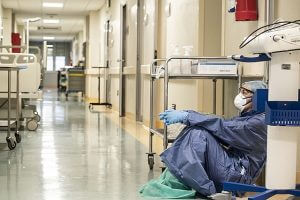Scientists have been exploring the relationship between the nasal microbiome and COVID-19 for years. Research has shown that a person’s COVID-19 virus can affect their nose microbiome, which in turn affects how they respond to the infection.
Also, scientists have found that the Bacteriodes species is positively associated with COVID-19 infections. Also, Prevotella copri has been shown to be higher in individuals who had bronchiolitis.
It’s important for people to understand how many other bacteria may play a role in causing these respiratory infections because of the potential linkages between the nasal microbiome and respiratory health.
In this blog post, we will explore these new findings and what they mean for people who have or are at risk of COVID-19! If you are interested in learning more about SARS-CoV-2 infection and diagnosis, don’t forget to read our dedicated articles.

What is Nasal microbiome?
The nasal microbiome is the collection of microorganisms that live in your nose. The microbes can be found in both healthy and diseased people, but there has been recent research to determine whether or not nasal microbiome could play a role in COVID-19 infection. A study published by JAMA Network Open shows that patients with chronic rhinosinusitis are more likely to have an increased nasopharyngeal bacterial load than those without this condition. This means that if you suffer from chronic rhinosinusitis, then you may be at risk for COVID-19 infections and complications, such as viral pneumonia. These findings show the power of understanding the relationship between the nasal microbiome and different respiratory conditions such as COVID-19!
Nasal microbiome and its role in respiratory health
The nose is the first line of defence for the respiratory system. It’s lined with a thin sheet of tissue called mucus and has many tiny hair-like cells that trap bacteria which then gets swept away into the throat. The nose also contains a large number of different bacteria, including those found in the gut, on the skin and even amongst some fungi living on its surface. These bacteria are normal residents of the nose, and they help to protect it from dangerous or harmful bacteria which can enter through the mouth or elsewhere in the body.
Each person’s nasal microbiome is unique, and scientists think that changes in this microbiome may play a role in respiratory disease. Newborns have a very low diversity of bacteria in their nasal microbiome, and by the age of two they contain a large range. These changes are thought to be caused by certain triggers such as feeding methods or exposure to allergens that kick-start an immune response leading to modifications in the nose’s bacterial population.
Some studies have found that children with asthma had fewer types of nasal microbes when compared to healthy participants (although other research has shown no difference). This suggests that altering this microbiome may lead to respiratory disease. Other studies have also found links between high levels of specific bacteria like Sneathia sanguinetti which can cause ear infections and the development of pneumonia from COVID-19.
Latest on COVID-19 and Nasal microbiome
Scientists have found that there is a positive association between the presence of Bacteriodes in nasal samples and COVID-19 infection, meaning those individuals with more Bacterodess are likely to have an increased chance of contracting this respiratory pathogen. Another study showed that patients who had been previously diagnosed with bronchiolitis displayed higher levels of Prevotella copri when compared to control participants. This suggests again that having high levels of Prevotidella may lead to greater chances of developing pneumonia from COVID-19.
More recent studies discovered that microorganisms in the nose are another underlying factor that may control COVID outcomes. To investigate this, researchers at the University of California, Irvine, examined the nasal microbiomes of 68 hospitalized COVID patients, 45 healthcare workers, and 21 healthy controls. The team found that acute SARS-CoV-2 infections were associated with distinct shifts in the nasal microbiome.
How to maintain a healthy nasal microbiome
By maintaining a healthy lifestyle, you will have a healthier nasal microbiome. This is because poor diet and lack of exercise can affect the balance between good bacteria and bad bacteria in your nose.
- Stay away from cigarette smoke; smoking causes sinusitis and allergic reaction with symptoms such as sneezing, coughing, running nose, red eyes.
- Do not indulge in alcoholic beverages; alcohol dissolves the mucus membranes of the nasal passage which may lead to the development of sinusitis.
- Maintain a proper sleep schedule; when you are sleeping or resting, your body goes through a natural process called “turnover” wherein it takes out cilia that have been damaged by environmental factors such as dry air.
Ways to improve coronavirus treatment regimen with a healthy nasal microbiome
There are some ways to improve your COVID-19 treatment regimen by maintaining a healthy nasal microbiome. It can be done by taking care of yourself and not smoking or drinking alcohol, especially if you have an unbalanced microbiota.
You can also be associated reduce the number of antibiotics you take as well as not using nasal sprays. You can microwave your cooking oil to kill any potentially harmful microbes on it before cooking with it, wash your hands often and don’t handle animals. Other ways to help your microbiome is by eating fermented foods, using lotion and not showering with hot water. You can use probiotics such as lactobacillus acidophilus which you find in some yogurts or even pill supplements of the same bacteria if you are unable to consume them on a regular basis. Finally, increasing your amount of fermentable fibres may result in positive health effects for improving intestinal microbiota composition and reducing inflammation markers like C-reactive protein (CRP) while also boosting short-chain fatty acids (SCFA).
Conclusion
When it comes to the association between nasal microbiome and COVID-19, there is still much more research that needs to be done. However, this article has helped shed light on how important a healthy nasal microbiome may be for preventing or treating COVID-19 infection.
As so many people struggle with chronic sinusitis, doctors have been looking into ways of improving health by adjusting diet and taking supplements like probiotics and prebiotics which help regulate gut bacteria levels (which in turn can improve your immune system).
If you are also dealing with these symptoms then we highly recommend talking to our experts today about what treatment options might work best for you!
UCI News, Insights into the interplay between Covid and the nasal microbiome
https://news.uci.edu/2021/08/19/insights-into-the-interplay-between-covid-and-the-nasal-microbiome/ acessed 25th August, 2021
Nasopharyngeal microbiome reveals the prevalence of opportunistic pathogens in SARS-CoV-2 infected individuals and their association with host types https://www.sciencedirect.com/science/article/pii/S1286457921001027 acessed 25th August, 2021
Interplay between severities of COVID-19 and the gut https://pubmed.ncbi.nlm.nih.gov/33632296 acessed 25th August, 2021
The content shared on the Health Literacy Hub website is provided for informational purposes only and it is not intended to replace advice, diagnosis, or treatment offered by qualified medical professionals in your State or Country. Readers are encouraged to confirm the information provided with other sources and to seek the advice of a qualified medical practitioner with any question they may have regarding their health. The Health Literacy Hub is not liable for any direct or indirect consequence arising from the application of the material provided.



